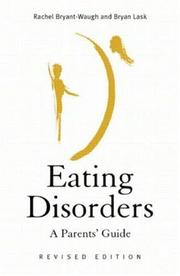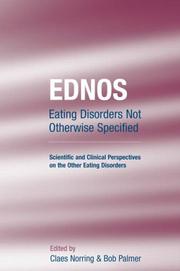| Listing 1 - 10 of 568 | << page >> |
Sort by
|
Book
ISBN: 9781609184957 1609184955 Year: 2010 Publisher: New York: Guilford press,
Abstract | Keywords | Export | Availability | Bookmark
 Loading...
Loading...Choose an application
- Reference Manager
- EndNote
- RefWorks (Direct export to RefWorks)
Eminently practical and authoritative, this comprehensive clinical handbook brings together leading international experts on eating disorders to describe the most effective treatments and how to implement them. Coverage encompasses psychosocial, family-based, medical, and nutritional therapies for anorexia nervosa, bulimia nervosa, binge-eating disorder, and other eating disorders and disturbances. Especially noteworthy are "mini-manuals" that present the nuts and bolts of 11 of the treatment approaches, complete with reproducible handouts and forms. The volume also provides an overview of assessment, treatment planning, and medical management issues. Special topics include psychiatric comorbidities, involuntary treatment, support for caregivers, childhood eating disorders, and new directions in treatment research and evaluation.
Book
ISBN: 0195373626 9780195373622 Year: 2010 Publisher: Oxford: Oxford university press,
Abstract | Keywords | Export | Availability | Bookmark
 Loading...
Loading...Choose an application
- Reference Manager
- EndNote
- RefWorks (Direct export to RefWorks)
Book
ISBN: 1854333984 Year: 2004 Publisher: [Place of publication not identified] British Psychological Society
Abstract | Keywords | Export | Availability | Bookmark
 Loading...
Loading...Choose an application
- Reference Manager
- EndNote
- RefWorks (Direct export to RefWorks)

ISBN: 1583918604 Year: 2004 Publisher: Philadelphia, PA : Brunner-Routledge,
Abstract | Keywords | Export | Availability | Bookmark
 Loading...
Loading...Choose an application
- Reference Manager
- EndNote
- RefWorks (Direct export to RefWorks)
Book
ISBN: 9789022335079 Year: 2018 Publisher: Antwerpen Manteau
Abstract | Keywords | Export | Availability | Bookmark
 Loading...
Loading...Choose an application
- Reference Manager
- EndNote
- RefWorks (Direct export to RefWorks)
In België heeft 13 procent van de jongeren overgewicht, 3 procent is obees. Deze problematiek vraagt om een specifieke behandeling, op maat van elk kind.· Welke voeding heeft je kind nodig op welke leeftijd?· Hoe ziet een ideale maaltijd eruit?· Welke sport kan je kind het best beoefenen in elke fase van zijn ontwikkeling?· Maar ook: hoe ga je om met de emoties die dik zijn met zich meebrengt?· Hoe kun je als ouder grenzen stellen, belonen, motiveren en zeker ook: hoe geef je het goede voorbeeld?Op deze en nog veel meer vragen geeft Leven met een extra rugzak een helder antwoord. De essentie is niet superslanke kinderen krijgen, wel gezonde kinderen die zich goed in hun vel voelen omdat ze op een andere manier eten en meer bewegen.Een praktische leidraad om je kind te helpen een gezond gewicht te bereiken én te behouden!

Abstract | Keywords | Export | Availability | Bookmark
 Loading...
Loading...Choose an application
- Reference Manager
- EndNote
- RefWorks (Direct export to RefWorks)
Eating Disorders --- Eating Disorders --- Eating disorders --- Eating disorders. --- Classification. --- Diagnosis.
Book
ISBN: 041562956X 9781315758176 9780415629577 9780415629560 1315758172 0415629578 Year: 2014 Publisher: New York, NY: Routledge,
Abstract | Keywords | Export | Availability | Bookmark
 Loading...
Loading...Choose an application
- Reference Manager
- EndNote
- RefWorks (Direct export to RefWorks)
In this edited volume, Jean Petrucelli brings together the work of talented clinicians and researchers steeped in working with eating disordered patients for the past 10 to 35 years. Eating disorders are about body-states and their relational meanings. The split of mindbody functioning is enacted in many arenas in the eating disordered patient’s life. Concretely, a patient believes that disciplining or controlling his or her body is a means to psychic equilibrium and interpersonal effectiveness. The collected papers in Body-States: Interpersonal and Relational Perspectives on the Treatment of Eating Disorders elaborates the essential role of linking symptoms with their emotional and interpersonal meanings in the context of the therapy relationship so that eating disordered patients can find their way out and survive the unbearable.The contributors bridge the gaps in varied protocols for recovery, illustrating that, at its core, trust in the reliability of the humanness of the other is necessary for patients to develop, regain, or have - for the first time - a stable body. They illustrate how embodied experience must be cultivated in the patient/therapist relationship as a felt experience so patients can experience their bodies as their own, to be lived in and enjoyed, rather than as an ‘other’ to be managed. In this collection Petrucelli convincingly demonstrates how interpersonal and relational treatments address eating problems, body image and "problems in living." Body States: Interpersonal and Relational Perspectives on the Treatment of Eating Disorders will be essential reading for psychoanalysts, psychotherapists, psychologists, psychiatrists, social workers, and a wide range of professionals and lay readers who are interested in the topic and treatment of eating disorders.
Book
ISBN: 2749227577 Year: 2006 Publisher: Toulouse (33 avenue Marcel Dassault 31500) : ERES,
Abstract | Keywords | Export | Availability | Bookmark
 Loading...
Loading...Choose an application
- Reference Manager
- EndNote
- RefWorks (Direct export to RefWorks)
Quelles sont les avancées actuelles de la clinique de l'oralité avec son cortège de plaintes, de souffrances, voire de destructions subjectives ? Freud, et à sa suite Lacan, ont forgé des outils pour permettre aux cliniciens la prise en charge de problèmes comme l'anorexie ou la compulsion boulimique. Cet ouvrage propose une lecture croisée de différents discours abordant l'invasion du réel dans un corps qui cherche une adresse à sa plainte : corps comme plaque tournante au discours de l'Autre, au discours médical ou social, au discours sur l'appétence du rien. Au-delà de la nosographie ou d'une démarche d'identification à l'objet de soin, quelque chose reste à entendre au un par un du désir en exil d'un corps ritualisé qui ne peut en convoquer la lumière. Se dédier à des jouissances tutoyant la mort ou s'adonner à l'inexorable de son propre effacement reste une dérive dont le non-sens peut parfois aboutir à des énigmes signifiantes quand un autre discours - psychanalytique et subjectivant - se trouve proposé. Au long de ces textes, s'égraineront pratique clinique, réflexions théoriques et volonté de subjectivation, comme autant de perspectives nouvelles face aux butées d'un corps primitif, archaïque. Le désir, on le verra, y sera finalement toujours pour quelque chose.
Book
Year: 2023 Publisher: London : IntechOpen,
Abstract | Keywords | Export | Availability | Bookmark
 Loading...
Loading...Choose an application
- Reference Manager
- EndNote
- RefWorks (Direct export to RefWorks)
Recent Updates in Eating Disorders raises recent relevant issues about eating disorders and obesity that have led us to speak of an 'eating disorder society', especially among adolescents who are at the most vulnerable stage of life. It is important not only to be aware of the behaviours that occur before the emergence of an eating disorder, but also, from a clinical perspective, to talk about diagnostic criteria. It is also important to specify, as accurately as possible, the severity criteria and the presence of comorbidity, in order to establish better protocols for therapeutic action. We also address the issue of social media networks and their influence on the development of eating disorders (and many other problems). While this work is neither exhaustive nor extensive, we nevertheless hope it will be of interest and will open up further lines of study and research in the near future.
Book
ISBN: 2807343988 Year: 2018 Publisher: Paris : De Boeck Supérieur,
Abstract | Keywords | Export | Availability | Bookmark
 Loading...
Loading...Choose an application
- Reference Manager
- EndNote
- RefWorks (Direct export to RefWorks)
"Ce livre fournit aux professionnels et aux étudiants les informations les plus récentes et les plus complètes sur la déficience intellectuelle et ses répercussions tant que le plan neuropsychologique que psychopathologique. Il fait également le tour des prises en charges validées et adaptées selon l'étiologie de la déficience : autisme, trisomie 21 et autres anomalies chromosomiques, épilepsie, maladies infectieuses.".
| Listing 1 - 10 of 568 | << page >> |
Sort by
|

 Search
Search Feedback
Feedback About UniCat
About UniCat  Help
Help News
News